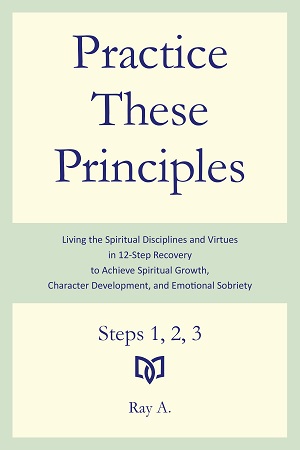
"But the disciplines will not accomplish these things on their own. The disciplines are means or channels. They are the agency through which we practice the second set of principles embedded in the Steps. These are the virtues.
Like principles and Steps, disciplines and virtues are also sometimes conflated in AA. This results in part from the fact that the practice of a virtue requires discipline in the sense of consistent and repeated effort. More generally, the confusion stems from the fact that disciplines and virtues are closely connected and interdependent. They share common ends. Both are ordered to our relationship with God and neighbor. Both seek to further a spiritual transformation that brings about a change in character and in emotional and behavior patterns.
But while the disciplines aim to effect this change, we might say, indirectly, through the practice of certain acts (self-examination, confession, restitution) that remain external to us, the virtues aim to do so directly, through the practice of certain acts that ingrain specific interior qualities in us to which the acts correspond and of which they are the outward manifestation.
Examining, admitting, and making amends for our wrongs are activities that require certain inner qualities in us if we are to carry them out to good purpose and maximum effect. When driven by these qualities, repeated practice of the activities has the effect of etching the qualities deep into the self so that overtime they become the kinds of interior habits we call character traits.
While complementary, then, disciplines and virtues are not equivalent. Disciplines are activities, virtues their motivating traits. Disciplines involve external acts, virtues include their internal qualities. Disciplines are what we do, virtues how we do them.
Virtues are interior habits or traits of character, and in recovery we acquire them in the process of practicing them within the framework of the disciplines. We practice the virtues that they may take root in us, that they may become an ingrained and integral part of our character, disposing us to think, to feel and to act in certain ways.
As they do, our practice of the disciplines becomes progressively better and, in time, virtuous, that is, fully in tune with their objectives and fully capable of realizing them. The dynamic is one where virtuous action generates traits of virtue, which in turn generate more virtuous action, and do so more naturally, with greater consistency, and within a greater range of situations. . . .
These virtues are variously embedded in different Steps. Those in boldface are the ones that will ring a bell with most of us. We may easily link many of them to specific Steps. We may associate humility with Steps 1 and 7; open-mindedness and hope with Step 2; willingness, acceptance, serenity, courage and wisdom with Step 3. Faith we may connect with Steps 2, 3, 6, 7 and 11; forgiveness with Steps 8, 9 and 10. And we may associate honesty, one of the most frequently mentioned virtues in the program, with a number of Steps, including Steps 1, 2, 4, 5, 6 and 8, 9 and 10. Gratitude, joy, and love are all virtues that we may link with Step 12.
Linking the virtues to the disciplines that are also embedded in those Steps may not be as easy, but it isn’t hard to see that surrender calls for humility; self-examination, confession and restitution for honesty, and prayer for faith.
The disciplines and the virtues are the “what” and the “how” of the Steps. This is reflected in a familiar acronym that stands for three of the virtues on our list, virtues widely considered indispensable for recovery: Honesty, Open-mindedness, Willingness (HOW). If we don’t have these three, even in their most rudimentary form, our chances of getting sober are practically nil. If we don’t grow in these and the rest of the virtues, our chances for emotional sobriety are equally negligible.
To grow in them and be able to work the Steps and practice the principles fully in all we do, we need to attend to the virtues, know what they are, how they are acquired, and how they work in tandem with the disciplines to further our recovery."
– From "The Virtues," pp. 18–20
For more PTP123 Excerpts, please click on link.